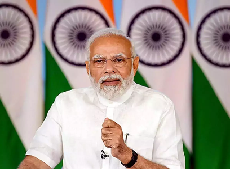In the last 5 years, the Narendra Modi government almost doubled India’s defence budget from Rs 2.74 lakh crore in 2017 to Rs 5.25 lakh crore in 2022, an increase of 91.16%. Faced with Lok Sabha elections next year and the ongoing Chinese threat on the Ladakh border, the government will want to be seen making efforts on the defence front, and therefore experts anticipate a 10-15% increase in defence spending in Union Budget 2023-24.
Defence spending ahead of Lok Sabha elections 2024
Modi government’s 2023 defence budget is expected to be a crucial factor in the upcoming election year 2024. With tensions on the border with China, the government is likely to continue to increase defence spending in order to strengthen the country’s military capabilities.
Many expect the Narendra Modi-headed nationalist government to continue increasing defence spending in 2023-24 as well. The defence sector anticipates that FM Sitharman will increase defence spending by 10-20% for 2023-24.
The government is also expected to encourage procurement from defence start-ups and provide tax exemptions to promote innovation and development in the sector. To attract foreign investment, the government may also initiate structural reforms such as the introduction of a Defence Procurement Policy.
As the defence budget is expected to be a key factor in the 2024 elections, the government will be closely watched for their commitment to national security and the defence industry.
Defence spending over the years
The total size of the Union Budget 2022-23 was Rs 39.45 lakh crore, with 13.31% (Rs 5.25 lakh crore) allocated to the Ministry of Defence. This included Rs 1.19 lakh crore for defence pensions. The defence budget has increased by 9.82% (Rs 46,970 crore) compared to the 2021-22 budget estimates.
In the last five years, the defence budget has increased from Rs 2.74 lakh crore in 2017 to 5.25 lakh in 2022, an increase of 91.16%.
In the budget for 2023, the government is expected to increase capital budget allocations and implement inflation-proofing measures. Additionally, industry experts are hoping for increased investment in R&D, procurement and more attention to MSMEs in the defence sector, as well as the extension of Trade Receivables Discounting System (TReDs) to the Army, Navy, Airforce, and Coast Guard.
Encouraging Procurement from defence start-ups
Industry insiders expect that Budget 2023 encourage procurement from defence start-ups that have innovative products and allow tax exemptions for the sector to promote innovation and development. The government should also provide incentives for companies manufacturing defence equipment within the country, access to defence technology, and funds for research and development initiatives.
Structural reforms for increased transparency
In order to spur growth in the defence sector and attract foreign investment, the government should consider initiating structural reforms such as the introduction of a Defence Procurement Policy for clear vendor selection and streamlining defence sector regulations for easier licensing to manufacture defence equipment.

